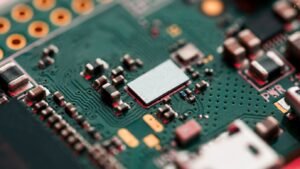AI Automation: What Is It?
AI automation, also known as Artificial Intelligence Automation, refers to the use of AI technologies to automate repetitive tasks and processes that were traditionally performed by humans. This includes tasks that require cognitive abilities such as decision-making, problem-solving, and learning.
Key Takeaways
- AI automation uses AI technologies to automate repetitive tasks.
- It can handle cognitive tasks such as decision-making and problem-solving.
- AI automation is transforming various industries and increasing efficiency.
With the advancements in AI technologies, machines can now analyze large amounts of data, recognize patterns, and make decisions more effectively than ever before. This has led to the emergence of AI automation as a powerful tool in various industries, including healthcare, manufacturing, finance, and customer service, among others.
*AI automation involves the use of algorithms and data to optimize processes and improve efficiency, ultimately leading to cost savings and increased productivity.
One major advantage of AI automation is that it can handle complex tasks with precision and speed. Machines equipped with AI algorithms can process and analyze vast amounts of data in real-time, enabling faster decision-making and problem-solving. This can significantly reduce the time and effort required to complete tasks, leading to increased productivity and efficiency.
Additionally, AI automation can eliminate human errors that often occur in repetitive tasks. Machines are not prone to fatigue, distraction, or emotional biases, ensuring consistent and accurate performance. This can have a significant impact on industries that rely on precision and quality, such as manufacturing and healthcare.
The Impact of AI Automation
AI automation is transforming industries across the board, revolutionizing the way businesses operate. Here are some key impacts of AI automation:
- Increased Efficiency: AI automation can perform tasks faster and more accurately, leading to increased productivity and efficiency.
- Cost Savings: By automating repetitive tasks, companies can reduce labor costs and allocate resources more effectively.
- Improved Decision-Making: AI algorithms can analyze vast amounts of data and provide valuable insights for better decision-making.
- Enhanced Customer Service: AI-powered chatbots and virtual assistants can provide 24/7 support and personalized assistance to customers.
AI Automation in Different Industries
AI automation is being adopted across various industries, bringing significant benefits and transforming the way businesses operate. Here are some examples:
| Industry | AI Automation Applications |
|---|---|
| Healthcare | Medical imaging analysis, patient diagnosis, drug discovery |
| Manufacturing | Quality control, predictive maintenance, robotic process automation |
| Finance | Algorithmic trading, fraud detection, risk assessment |
Furthermore, AI automation is also being utilized in customer service and support, transportation, logistics, marketing, and many other sectors.
Future of AI Automation
The future of AI automation looks promising as advancements continue to be made in AI technologies. With the ability to handle complex tasks, make accurate decisions, and learn from data, AI automation is expected to become even more prevalent. As industries continue to embrace AI automation, we can expect increased efficiency, cost savings, and improved overall performance.

Common Misconceptions
Misconception 1: AI Automation Means Replacing Human Workers
One common misconception about AI automation is that it aims to replace human workers entirely. However, AI automation is not about eliminating jobs, but rather enhancing and streamlining human work processes.
- AI automation can help workers focus on more creative and complex tasks
- AI automation can reduce errors and improve accuracy
- AI automation can increase productivity and efficiency in various industries
Misconception 2: AI Automation is Only Relevant for Tech Companies
Another misconception is that AI automation is only relevant for tech companies. In reality, AI automation has the potential to benefit various industries and sectors, not limited to the tech industry.
- AI automation can streamline operations in healthcare, finance, and manufacturing industries
- AI automation can improve customer service and support in retail and hospitality industries
- AI automation can optimize supply chain management and logistics in transportation and logistics industries
Misconception 3: AI Automation Is Too Expensive for Small Businesses
Many people believe that AI automation is only feasible for large corporations with substantial financial resources. However, AI automation solutions are becoming more accessible and affordable for small businesses as well.
- There are cost-effective AI automation tools and platforms available for small businesses
- AI automation can help small businesses minimize operational costs and maximize productivity
- AI automation can provide a competitive advantage to small businesses by improving efficiency
Misconception 4: AI Automation is Infallible and Perfect
Contrary to popular belief, AI automation is not infallible and perfect. While AI technologies have advanced significantly, they still have limitations and can make mistakes.
- AI automation can have biases and limitations based on the data it is trained on
- AI automation can make errors when faced with unexpected or unusual situations
- Human supervision and intervention are still essential for AI automation to ensure accuracy and handle exceptional cases
Misconception 5: AI Automation Threatens Privacy and Security
There is a misconception that AI automation poses a significant threat to privacy and security. While there are indeed risks associated with AI automation, proper implementation and safeguards can mitigate these concerns.
- Data protection measures can be implemented to safeguard sensitive information
- Regular security audits can identify and address potential vulnerabilities in AI automation systems
- Ethical frameworks and regulations can ensure responsible use of AI automation technologies

AI Automation: What Is It?
Artificial Intelligence (AI) has been revolutionizing various industries, increasing efficiency, and transforming the way we work. AI automation involves using advanced algorithms and machine learning to automate tasks that traditionally require human intelligence. In this article, we explore ten fascinating aspects of AI automation through the following tables:
The Rise of AI in Industries
AI technologies have gained significant traction in various sectors worldwide. This table illustrates the projected growth of AI market size across different industries by 2025:
| Industry | Projected AI Market Size (2025) |
|---|---|
| Healthcare | $31.28 billion |
| Retail | $28.89 billion |
| Finance | $24.77 billion |
| Manufacturing | $16.7 billion |
AI-Enabled Job Transformations
AI automation is reshaping the job landscape, leading to the emergence of new roles and the transformation of existing jobs. This table showcases the percentage of employees who will experience job displacement or transition by 2030:
| Job Category | Percentage of Employees Affected |
|---|---|
| Finance and Accounting | 95% |
| Transportation | 75% |
| Customer Service | 60% |
| Manufacturing | 45% |
Global Adoption of AI Automation
AI automation has witnessed rapid adoption globally. This table showcases the percentage of organizations across different countries that have implemented AI technologies:
| Country | Percentage of Organizations |
|---|---|
| China | 77% |
| United States | 62% |
| Germany | 52% |
| Japan | 39% |
AI Automation and Job Creation
While AI automation has the potential to displace certain job roles, it also leads to the creation of new employment opportunities. This table represents the job creation potential of AI technologies:
| Industry | Projected New Jobs by 2025 |
|---|---|
| Healthcare | 2.3 million |
| Information Technology | 1.9 million |
| Finance | 1.7 million |
| Retail | 1.2 million |
Impact of AI Automation on Productivity
AI automation significantly enhances productivity in various industries. This table demonstrates the percentage increase in productivity achieved through AI adoption:
| Industry | Percentage Increase in Productivity |
|---|---|
| Manufacturing | 35% |
| Healthcare | 27% |
| Finance | 23% |
| Retail | 18% |
AI Automation and Cost Reduction
AI technologies offer substantial cost-saving opportunities for businesses. This table illustrates the cost reduction achieved through AI automation:
| Industry | Cost Reduction (Annual) |
|---|---|
| Manufacturing | $8.24 billion |
| Healthcare | $5.74 billion |
| Transportation | $3.68 billion |
| Retail | $2.97 billion |
AI Automation and Customer Satisfaction
AI automation plays a crucial role in delivering enhanced customer experiences. This table represents the impact of AI on customer satisfaction levels:
| Industry | Customer Satisfaction Improvement (Percentage) |
|---|---|
| Retail | 46% |
| Banking | 36% |
| Travel and Hospitality | 31% |
| Telecommunications | 28% |
Ethical Considerations in AI Automation
AI automation raises ethical concerns that need to be addressed. This table highlights the ethical considerations associated with AI implementation:
| Ethical Consideration | Percentage of Organizations Addressing |
|---|---|
| Data Privacy | 92% |
| Algorithmic Bias | 76% |
| Job Displacement | 68% |
| Transparency and Explainability | 55% |
AI Automation and Future Outlook
AI automation is continuously evolving, and its future holds immense potential. This table showcases the key emerging trends in AI automation:
| Trend | Details |
|---|---|
| Human-Augmented AI | Integration of AI and human intelligence to enhance decision-making |
| Explainable AI | Development of AI systems that provide transparent explanations for their decisions |
| AI-Powered Healthcare | Advancements in AI technologies to revolutionize healthcare diagnostics and treatment |
| Autonomous Vehicles | Widespread adoption of self-driving cars and other autonomous modes of transportation |
AI automation is transforming industries, impacting jobs, and offering new opportunities for businesses worldwide. The integration of AI technologies enables improvements in productivity, cost reduction, customer satisfaction, and overall efficiency. However, it is crucial to address ethical considerations and ensure a transparent and accountable AI framework. As we move forward, future trends, such as human-augmented AI, explainable AI, AI-powered healthcare, and autonomous vehicles, hold immense promise for further advancements in AI automation.
Frequently Asked Questions
What is AI Automation?
AI Automation refers to the use of artificial intelligence technologies to automate repetitive tasks and processes that would normally require human intervention.
How does AI Automation work?
AI Automation works by leveraging algorithms and machine learning models to analyze data, make predictions, and perform actions without the need for direct human input. It involves training AI systems to mimic human intelligence and logic to carry out specific tasks.
What are the benefits of AI Automation?
AI Automation offers several benefits, including increased efficiency, improved accuracy, cost reduction, faster processing times, and the ability to handle large volumes of data. It also frees up human resources to focus on more complex and creative tasks.
What tasks can be automated with AI?
A wide range of tasks can be automated using AI, such as data entry, document processing, customer support, inventory management, data analysis, content creation, and repetitive manufacturing processes, among others.
Is AI Automation applicable to all industries?
Yes, AI Automation can be applied to various industries, including healthcare, finance, manufacturing, retail, transportation, customer service, and more. The potential applications of AI Automation are vast and continue to expand.
What are some examples of AI Automation?
Examples of AI Automation include chatbots that handle customer inquiries, automated email responses, recommendation systems that personalize content, automated data analysis tools, and autonomous vehicles.
How is AI Automation different from traditional automation?
Traditional automation involves the use of machines and computer programs to carry out predefined tasks without the need for human intervention. AI Automation, on the other hand, employs artificial intelligence technologies to perform tasks that require cognitive abilities and decision-making similar to humans.
Are there any risks or challenges associated with AI Automation?
Yes, there are risks and challenges with AI Automation. Some concerns include potential job displacement, ethical considerations, data privacy and security issues, algorithm bias, and the need for continuous monitoring and regulation to ensure responsible use of AI technology.
Can AI Automation replace human workers completely?
While AI Automation can automate certain tasks, it is unlikely to replace human workers completely. AI is best utilized as a tool to augment human capabilities rather than replace them. Human input and oversight are still crucial in many areas, such as complex decision-making, creativity, and emotional intelligence.
How can businesses adopt AI Automation?
Businesses can adopt AI Automation by assessing their specific needs, identifying tasks that can be automated, and selecting suitable AI technologies or platforms. It is important to plan and implement AI Automation strategies with proper training, change management, and continuous evaluation to achieve optimal results.





